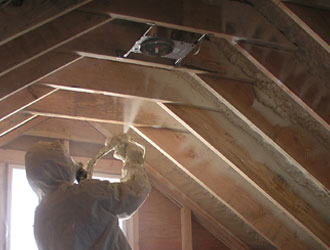
In a previous article, we discussed the advantage of spray foam insulation. But what are the various types of foam insulation? What are the benefits of each? If you have read the article on the advantages of foam insulation than you know that is more efficient, less time consuming to install and has a lower cost of ownership. With advances in technology, there are now several types of spray foam suited to different uses. In this article, we detail the different types of foam insulation and the advantages of each.
There are many different types of foam insulation, but the best type depends on your climate and needs. Generally speaking, the best foam insulation to use would be the closed cell foam insulation. The reason is that closed cell foam prevents water vapor from entering a home. The advantage of this is that humidity cannot penetrate into the house which can compromise the integrity of the walls, the roof, and the floors. The result is that you can save the money and frustration of having to replace or repair a buckling floor or warped drywall.
Closed cell foam insulation is a very easy way to apply insulation in your home. Designed for simplicity, this insulation kit provides a means for those that own a house to quickly install with the end result being a professional looking installation. This type of foam insulation is very environmentally friendly, with no use of hazardous chemicals used in traditional types of insulation. Closed cell foam has an R-7 per inch value, which is double the amount of insulation versus traditional fiberglass.
Anti-microbial foam insulation is basically the same as the closed cell, but has the addition of an anti-microbial ingredient which stops the spread of bacteria's for a higher level of protection. It is a recommended choice for those that live in humid climates or those areas that receive a lot of in climate weather such as snow and rain. The reason is that this form of foam helps regulate the moisture level that enters a home.
Open-cell foam insulation is a very cost-effective insulation solution for your home. It is often used in combination with other insulation methods due to its lower R rating. One may utilize lower density foam as the remainder of the product neededversus the use oftraditional fiberglass insulation
Slow rise foam insulation can be used in a wide variety of situations which makes it a very versatile choice. It has a very high density, which makes it an optimum choice for filling many areas including:
High-density foam insulation is the strongest of the different varieties and is used mainly in roofing applications. It absorbs much less moisture than any other type and is extremely durable.
As you can see, there are many types of foam insulation. The choices available offer flexibility to a homeowner. Each foam type has advantages, based on insulation requirements. The wise choice is to speak to one of our consultants to find the best type of foam insulation to meet your needs.
Spray foam is the fastest growing insulation material on the market because it lowers energy bills and improves occupant comfort. Our experienced VT contractors install foam insulation in and around the state of Vermont. Find out more about getting SPF installed in your home here.
Download the FREE Guide Now